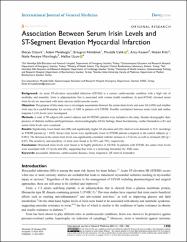Association Between Serum Irisin Levels and ST-Segment Elevation Myocardial Infarction

View/
Access
info:eu-repo/semantics/openAccessDate
2023Author
Öztürk, DeryaMelekoğlu, Adem
Altınkiler, Ertuğrul
Çalık, Mustafa
Kösem, Arzu
Kilci, Hakan
Mısırlıoğlu, Naile Fevziye
Uzun, Hafize
Metadata
Show full item recordCitation
Ozturk, D., Melekoglu, A., Altinbilek, E., Calik, M., Kosem, A., Kilci, H., Misirlioglu, N. F., & Uzun, H. (2023). Association Between Serum Irisin Levels and ST-Segment Elevation Myocardial Infarction. International journal of general medicine, 16, 1355–1362. https://doi.org/10.2147/IJGM.S403564Abstract
Background: An acute ST-elevation myocardial infarction (STEMI) is a serious cardiovascular condition with a high risk of morbidity and mortality. Irisin is adipomyokine that is associated with various health conditions. In post-STEMI, elevated serum irisin levels are associated with more adverse cardiovascular events.Objective: The purpose of this study was to investigate associations between the serum irisin levels and acute MI (AMI) and whether irisin may be a useful biomarker for severity of AMI in patients with STEMI. Possible correlations between serum irisin and cardiac troponin-I (cTi) levels were investigated.Methods: A total of 90 subjects (46 control subjects and 44 STEMI patients) were included in the study. Besides demographic data, presence of diabetes mellitus and hypertension, electrocardiography (ECG) findings, blood biochemistry, cardiac biomarkers (cTi) and serum irisin levels were examined.Results: Significantly lower heart rate (HR) and significantly higher ST-elevation and QTc interval were detected in ECG recordings in STEMI patients (p < 0.05). Serum irisin levels were significantly lower in STEMI patients compared to the control subjects (p < 0.001). The decrease in the serum irisin levels was significantly correlated with the increase in cTi levels, as well as increased QTc (p < 0.05). The sensitivity and specificity of irisin were found to be 93% and 78%, respectively.Conclusion: Decreased irisin levels were found to be highly predictive in STEMI. In patients with STEMI, the serum irisin levels were associated with cTi levels and QTc, suggesting that irisin is a promising biomarker for AMI cases.
















